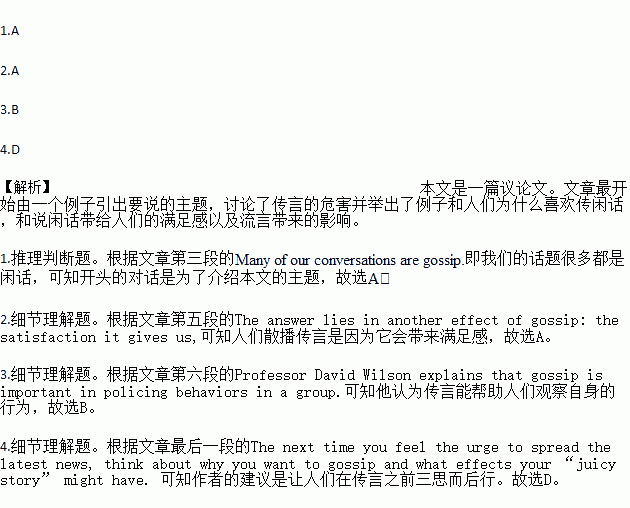题目内容
“Did you hear what happened to Adam Last Friday?”Lindsey whispers to Tori.
With her eyes shining, Tori brags, “You bet I did, Sean told me two days ago. ”
Who are Lindsey and Tori talking about? It just happened to be yours truly, Adam Freedmam. I can tell you that what they are saying is (a) not nice and (b) not even true. Still, Lindsey and Tori aren’t very different from most students here at Linton High School, including me. Many of our conversations are gossip(闲话). I have noticed three effects of gossip: it can hurt people, it can give gossipers a strange kind of satisfaction, and it can cause social pressures in a group.
An important negative effect of gossip is that it can hurt the person being talked about. Usually, gossip spreads information about a topic- breakups, trouble at home, even dropping out-that a person would rather keep secret. The more embarrassing or shameful the secret is, the juicier the gossip it makes. Probably the worst type of gossip is the absolute lie. People often think of gossipers as harmless, but cruel lies can cause pain.
If we know that gossip can be harmful, then why do so many of us do it? That answer lies in another effect of gossip: the satisfaction it gives us. Sharing the latest rumor(传言)can make a person feel important because he or she knows something that others don’t. Similarly, hearing the latest rumor can make a person feel like part of the “in group.”In other words, gossip is satisfying because it gives people a sense of belonging or even superiority(优越感).
Gossip also can have a third effect: it strengthens unwritten, unspoken rules about how people should act. Professor David Wilson explains that gossip is important in policing behaviors in a group. Translated into high school terms, this means that if everybody you hang around with is laughing at what John wore or what Jane said, then you can bet that wearing or saying something similar will get you the same kind of negative attention. The do’s and don’ts conveyed through gossip will never show up in any student handbook.
The effects of gossip vary depending on the situation. The next time you feel the urge to spread the latest news, think about why you want to gossip and what effects your “juicy story” might have.
1.The author uses a conversation at the beginning of the passage to ______.
A. introduce a topic B. present an argument
C. describe the characters D. clarify his writing purpose
2.In the author’s opinion, many people like to gossip because it ______.
A. gives them a feeling of pleasure
B. help them to make more friends
C. makes them better at telling stories
D. enables them to meet important people
3.Professor David Wilson think that gossip can ______.
A. provide students with written rules
B. help people watch their own behaviors
C. force school to improve student handbooks
D. attract the police’s attention to group behaviors
4.What advice does the author give in the passage?
A. Never become a gossiper B. Stay away from gossipers
C. Don’t let gossip turn into lies D. Think twice before you gossip.
 新课标快乐提优暑假作业陕西旅游出版社系列答案
新课标快乐提优暑假作业陕西旅游出版社系列答案
